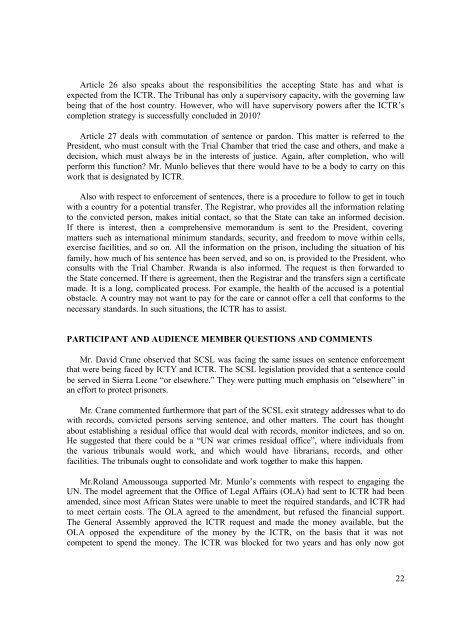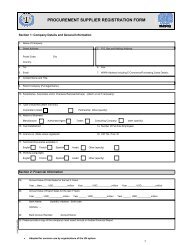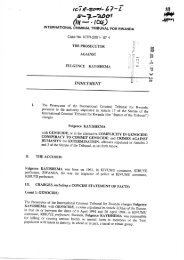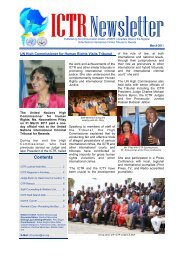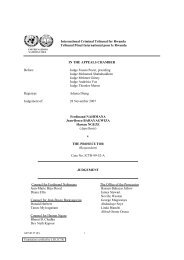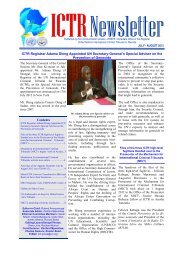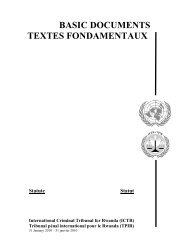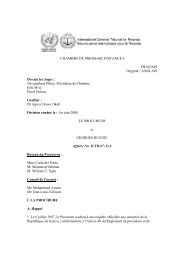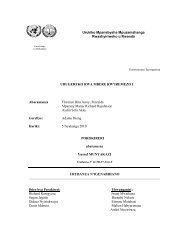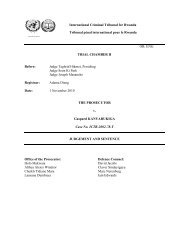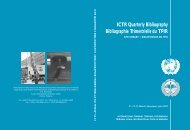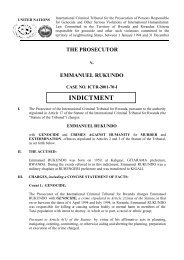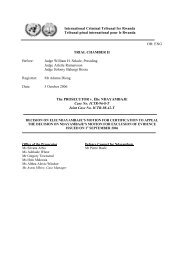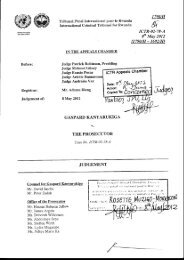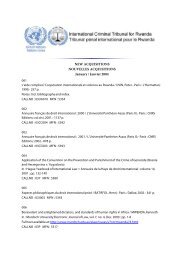Report of Proceedings - International Criminal Tribunal for Rwanda
Report of Proceedings - International Criminal Tribunal for Rwanda
Report of Proceedings - International Criminal Tribunal for Rwanda
Create successful ePaper yourself
Turn your PDF publications into a flip-book with our unique Google optimized e-Paper software.
Article 26 also speaks about the responsibilities the accepting State has and what is<br />
expected from the ICTR. The <strong>Tribunal</strong> has only a supervisory capacity, with the governing law<br />
being that <strong>of</strong> the host country. However, who will have supervisory powers after the ICTR’s<br />
completion strategy is successfully concluded in 2010?<br />
Article 27 deals with commutation <strong>of</strong> sentence or pardon. This matter is referred to the<br />
President, who must consult with the Trial Chamber that tried the case and others, and make a<br />
decision, which must always be in the interests <strong>of</strong> justice. Again, after completion, who will<br />
per<strong>for</strong>m this function? Mr. Munlo believes that there would have to be a body to carry on this<br />
work that is designated by ICTR.<br />
Also with respect to en<strong>for</strong>cement <strong>of</strong> sentences, there is a procedure to follow to get in touch<br />
with a country <strong>for</strong> a potential transfer. The Registrar, who provides all the in<strong>for</strong>mation relating<br />
to the convicted person, makes initial contact, so that the State can take an in<strong>for</strong>med decision.<br />
If there is interest, then a comprehensive memorandum is sent to the President, covering<br />
matters such as international minimum standards, security, and freedom to move within cells,<br />
exercise facilities, and so on. All the in<strong>for</strong>mation on the prison, including the situation <strong>of</strong> his<br />
family, how much <strong>of</strong> his sentence has been served, and so on, is provided to the President, who<br />
consults with the Trial Chamber. <strong>Rwanda</strong> is also in<strong>for</strong>med. The request is then <strong>for</strong>warded to<br />
the State concerned. If there is agreement, then the Registrar and the transfers sign a certificate<br />
made. It is a long, complicated process. For example, the health <strong>of</strong> the accused is a potential<br />
obstacle. A country may not want to pay <strong>for</strong> the care or cannot <strong>of</strong>fer a cell that con<strong>for</strong>ms to the<br />
necessary standards. In such situations, the ICTR has to assist.<br />
PARTICIPANT AND AUDIENCE MEMBER QUESTIONS AND COMMENTS<br />
Mr. David Crane observed that SCSL was facing the same issues on sentence en<strong>for</strong>cement<br />
that were being faced by ICTY and ICTR. The SCSL legislation provided that a sentence could<br />
be served in Sierra Leone “or elsewhere.” They were putting much emphasis on “elsewhere” in<br />
an ef<strong>for</strong>t to protect prisoners.<br />
Mr. Crane commented furthermore that part <strong>of</strong> the SCSL exit strategy addresses what to do<br />
with records, convicted persons serving sentence, and other matters. The court has thought<br />
about establishing a residual <strong>of</strong>fice that would deal with records, monitor indictees, and so on.<br />
He suggested that there could be a “UN war crimes residual <strong>of</strong>fice”, where individuals from<br />
the various tribunals would work, and which would have librarians, records, and other<br />
facilities. The tribunals ought to consolidate and work together to make this happen.<br />
Mr.Roland Amoussouga supported Mr. Munlo’s comments with respect to engaging the<br />
UN. The model agreement that the Office <strong>of</strong> Legal Affairs (OLA) had sent to ICTR had been<br />
amended, since most African States were unable to meet the required standards, and ICTR had<br />
to meet certain costs. The OLA agreed to the amendment, but refused the financial support.<br />
The General Assembly approved the ICTR request and made the money available, but the<br />
OLA opposed the expenditure <strong>of</strong> the money by the ICTR, on the basis that it was not<br />
competent to spend the money. The ICTR was blocked <strong>for</strong> two years and has only now got<br />
22


